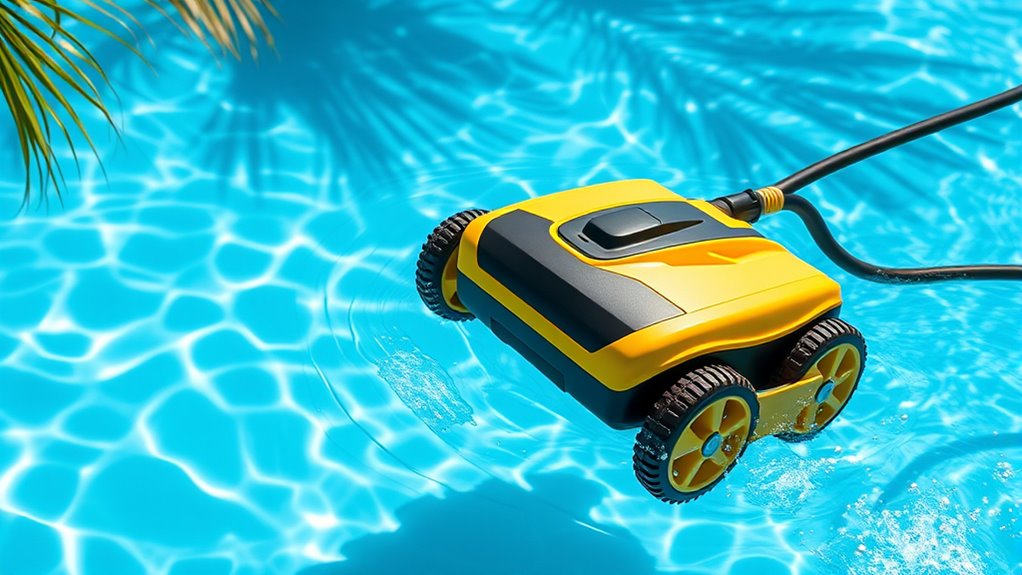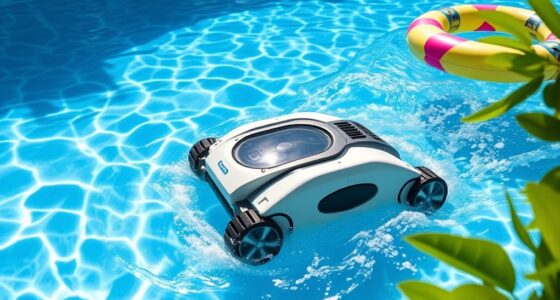How often you should run your suction pool cleaner depends on factors like pool size, usage, debris levels, and weather. Typically, running it 2-3 times a week works well, but during heavy use or windy days, you might need to do it more often. Keep an eye on debris and water clarity to adjust accordingly. If you want guidelines tailored to your pool’s needs, stay with us to find out more.
Key Takeaways
- Run your suction pool cleaner at least 2-3 times per week for optimal debris removal.
- Increase cleaning frequency during heavy debris days, such as after storms or windy weather.
- Adjust cleaning schedule based on pool usage, with more frequent runs for high-traffic or heavily used pools.
- Regularly check and clean the cleaner’s filter and hose to maintain efficiency and prevent clogs.
- During peak algae growth seasons or warmer months, run the cleaner more often to keep water clear.
Factors Affecting Cleaning Frequency

Several factors influence how often you should run your pool cleaner, and understanding these can help you maintain a sparkling pool with minimal effort. One key factor is your pool’s pool chemicals, which affect algae growth and debris buildup. Proper chemical balance reduces debris and keeps the water clear, meaning less frequent cleaning. Additionally, pump maintenance plays a significant role; a well-maintained pump ensures efficient circulation, preventing dirt from settling and reducing the load on your pool cleaner. The frequency of use also depends on your local environment—if you’re in a windy or dusty area, you’ll need to run the cleaner more often. Monitoring these elements helps you determine the best cleaning schedule, preventing overuse and ensuring your pool stays pristine with less effort. Regular pool maintenance and checking water chemistry can further optimize cleaning intervals. Staying informed about pool technology advancements can also help you select more efficient cleaning solutions and routines. Cultivating a bias to action can also help you stay consistent with your pool maintenance routine.
Typical Pool Usage and Its Impact
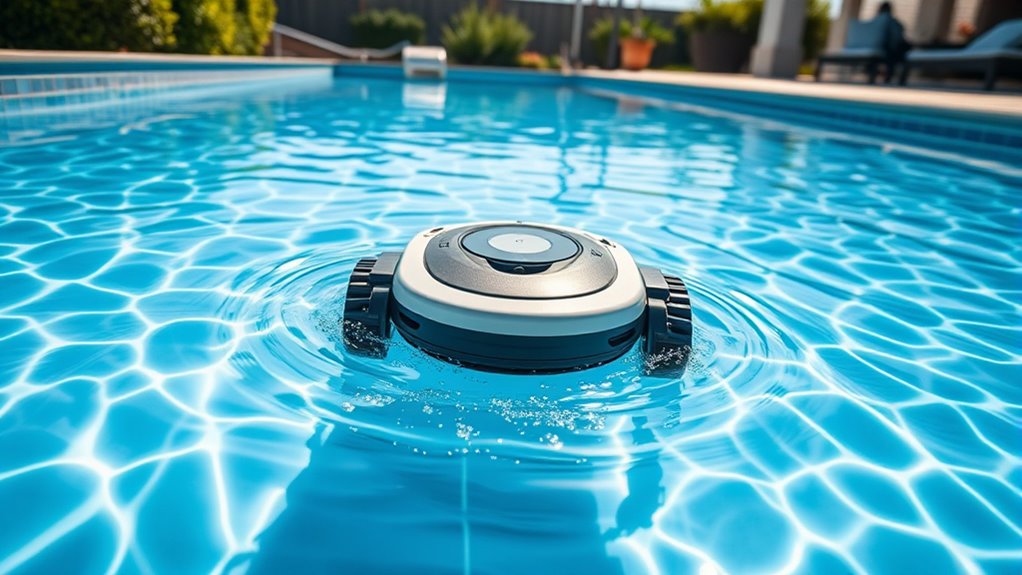
How often you use your pool, along with how quickly debris collects, directly influences how frequently you should run your cleaner. Larger or uniquely shaped pools may need more frequent attention to stay clean. Understanding your pool’s usage patterns helps you determine the right cleaning schedule. Additionally, incorporating aquatic exercise routines can help reduce debris buildup by maintaining a cleaner water environment. Regularly inspecting your pool’s filter system can also prevent clogging and ensure optimal performance. Using automatic pool cleaners can further streamline maintenance and keep the pool in top condition without requiring daily effort. Utilizing email marketing tools to send reminders about cleaning schedules can also encourage consistent maintenance.
Frequency of Pool Use
The frequency with which you use your pool directly affects how often you should run your pool cleaner. If you swim daily or several times a week, you’ll need to run the cleaner more often to keep the water clear and balanced. Regular use can introduce more debris and contaminants, so maintaining proper chemical balancing is essential to prevent algae growth and bacteria buildup. Additionally, frequent use means your filter will collect more dirt, so filter maintenance should be scheduled accordingly to guarantee ideal cleaning performance. On the other hand, if your pool sees occasional use, running the cleaner less frequently may suffice. Adjusting your cleaning schedule based on pool use helps keep your pool water sparkling and reduces the risk of issues caused by neglect. Proper filter maintenance and monitoring water quality are key to effective cleaning routines. Regularly checking water chemistry levels ensures your pool remains safe, inviting, and properly sanitized. To optimize your pool’s cleanliness, understanding the impact of usage frequency on cleaning needs can make a significant difference.
Debris Accumulation Rate
Your pool’s debris accumulation rate varies considerably based on how often you use it. If you swim daily or host frequent gatherings, you’ll notice more leaves, dirt, and insects collecting in the pool. Regular use means you’ll need to run your suction pool cleaner more often to keep the water clear. Proper pool filter maintenance is essential—clean your filter regularly to prevent clogs and maintain ideal flow. Additionally, maintaining proper chemical balancing helps reduce algae growth and residue buildup, lessening debris accumulation. When debris builds up quickly, your cleaner must work harder and more frequently to keep the pool clean. Monitoring debris levels and adjusting cleaning schedules accordingly ensures your pool stays inviting and safe, without unnecessary strain on your equipment. Incorporating digital literacy programs can also help homeowners better understand and manage their pool maintenance routines. Understanding your pool’s debris accumulation rate can help you optimize cleaning schedules and extend the lifespan of your equipment. Moreover, being aware of environmental factors such as surrounding vegetation can help you anticipate and mitigate additional debris entering the pool. Staying informed about automated cleaning technology can further improve efficiency and reduce manual maintenance efforts.
Pool Size and Shape
Larger or irregularly shaped pools typically require more frequent cleaning because they present a bigger surface area for debris to settle and more intricate corners for dirt to hide in. This means you’ll need to:
- Run your pool cleaner more often to keep debris, algae, and dirt at bay.
- Regularly check and adjust pool chemicals to prevent buildup and maintain clarity.
- Clean skimmer baskets frequently to support efficient debris collection.
- Pay close attention to skimmer maintenance, especially in complex shapes where debris can accumulate in hard-to-reach spots.
Pool Size and Debris Load

Your pool size directly affects how often you need to run your cleaner, with larger pools requiring more frequent attention. Heavy debris loads from trees or storms also mean you should run your cleaner more often to keep the water clear. Smaller pools with less debris can often go longer between cleanings without a problem. To maximize efficiency, consider the type of debris typically found in your area, which can influence cleaning frequency. Additionally, understanding market volatility and how it impacts your investments can help you make better decisions about your pool maintenance schedule, especially if you have a Gold IRA or other alternative assets. Being aware of camping resources can also remind you of the importance of proper planning and maintenance routines to keep your equipment in top shape. Regularly inspecting your equipment’s performance metrics can help identify potential issues early, ensuring your pool remains clean and safe. Monitoring symptoms of breast cancer can also be crucial in early detection and improving treatment outcomes.
Larger Pools, More Runs
When managing a bigger pool, it’s essential to run your cleaner more frequently because the increased size and debris load demand extra attention. Larger pools require higher robotic efficiency to keep the water clean, which often means running the cleaner more often. Keep these points in mind:
- Run your cleaner at least 3-4 times a week to maintain clarity.
- More runs help prevent debris buildup, reducing strain on the robotic motor.
- Frequent cleaning guarantees ideal energy consumption, avoiding overworking the system.
- Consistent schedules maintain water balance and reduce algae growth.
- Incorporating natural materials such as wood accents or stone features can enhance the aesthetic and help keep the environment clean.
Heavy Debris Accumulation
Does heavy debris accumulation necessitate more frequent pool cleaner runs? Yes, when your pool collects a lot of leaves, dirt, or other debris, you’ll need to increase your pool maintenance efforts. Frequent runs help prevent debris from settling on the bottom and clogging filters, ensuring your pool stays clean and safe. Heavy debris load can overwhelm your cleaner if you don’t stay on top of it, making debris management more challenging. Running your cleaner more often helps maintain proper circulation and keeps the water clear. Keep an eye on debris buildup and adjust your cleaning schedule accordingly. Additionally, understanding your pool’s debris type can help you choose the most effective cleaner and cleaning frequency. Recognizing debris accumulation patterns can optimize your maintenance routine and avoid unnecessary wear on your equipment. Using the right pool cleaning tools can also improve efficiency and reduce the need for excessive cleaning runs. Ultimately, regular runs will reduce overall cleaning time and preserve your pool’s equipment, making it easier to enjoy a pristine swimming environment.
Small Pools, Less Often
Smaller pools typically require less frequent cleaning because they have less surface area to accumulate debris. This means you can run your suction pool cleaner less often, helping maintain proper pool safety and chemical balance. To keep your small pool in top shape, consider these steps:
- Check debris levels daily and remove leaves or dirt promptly.
- Run your cleaner once every 2-3 days during peak debris times.
- Test water chemistry weekly to prevent algae and maintain safety.
- Adjust cleaning frequency if you notice increased debris or imbalanced chemicals.
Water Temperature and Chemical Balance
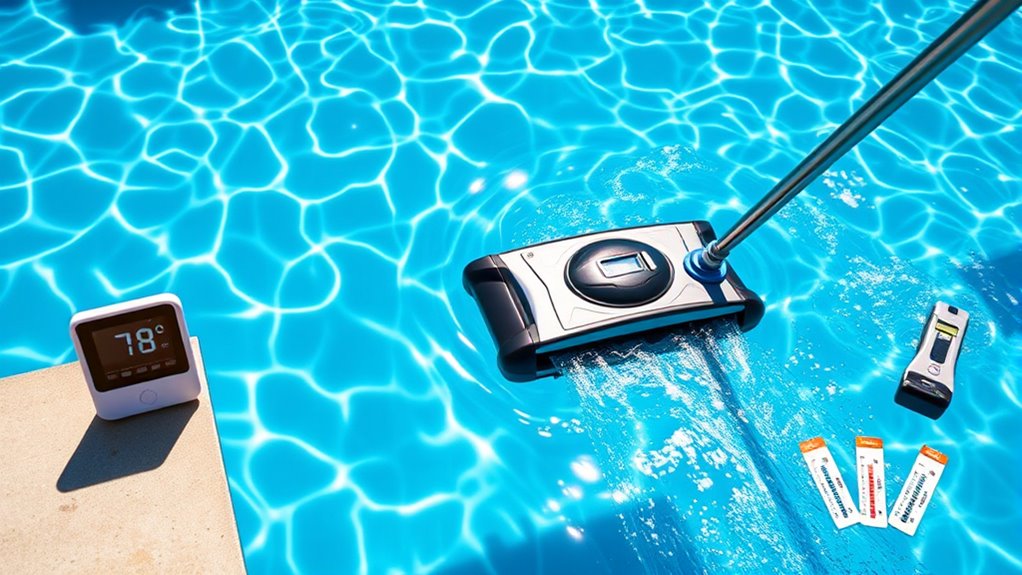
Water temperature and chemical balance play a crucial role in determining how often you should run your pool cleaner. When water temperature rises, algae and bacteria thrive, making your pool dirtier faster. This means you’ll need to run your cleaner more frequently to keep debris under control. Regularly testing and adjusting your pool’s chemical levels helps reduce the workload on your cleaner. Proper chemical management and adherence to safety standards can also prevent issues like chlorine leaks, which can be hazardous. Maintaining proper water chemistry is essential for preventing unwanted buildup and ensuring a safe swimming environment. In warm, chemically balanced water, you may need to run your cleaner more often, especially during peak swimming seasons. Proper maintenance ensures your pool stays clean with less effort.
Seasons and Weather Conditions

Your pool’s cleaning needs change with the seasons and weather. During peak usage in summer, you’ll likely run your cleaner more often, while colder months may require less frequent runs. Weather conditions like storms or high winds can also introduce debris, prompting more frequent cleaning sessions.
Seasonal Pool Usage
Seasonal changes and weather conditions greatly influence how often you should run your pool cleaner. During peak seasons, debris like leaves and dirt increase, requiring more frequent cleaning. To maintain ideal performance:
- Check your pool’s chemical balance regularly to prevent algae growth.
- Run your cleaner more often when water gets murky or debris accumulates quickly.
- Perform filter maintenance weekly to keep debris from clogging the system.
- Adjust cleaning frequency based on weather: more after storms or windy days.
In colder months, reduce cleaning but still monitor for debris buildup. Properly balancing chemicals and maintaining filters ensure your pool stays clear, reducing the workload on your cleaner and prolonging equipment life.
Weather Impact on Cleaning
Changing weather conditions throughout the year directly impact how often your pool cleaner needs to run. During hot, dry seasons, your outdoor environment generates more debris, such as leaves, pollen, and dirt, requiring frequent pool maintenance. Rainy or windy weather can wash debris into your pool, increasing the need for cleaning cycles. Cold weather often means less usage, but you still need to maintain cleanliness to prevent algae growth and keep your water clear. Be mindful of seasonal changes; in winter, running your cleaner less often may suffice, while summer demands more frequent runs. Adjusting your cleaning schedule based on weather helps optimize your pool’s cleanliness and reduces strain on your equipment. Weather directly influences how often you should run your suction pool cleaner for effective maintenance.
Signs Your Pool Needs Cleaning

When debris starts accumulating on the surface or the water looks murky despite regular filtration, it’s a clear sign your pool needs cleaning. Ignoring these signs can upset your pool chemistry and make algae prevention more difficult. Look for these indicators:
- Visible debris floating or settled on the bottom
- Cloudy or murky water that won’t clear after filtering
- Excess algae growth or greenish tint
- Unusual odors or slimy surfaces
If you notice any of these, it’s time to clean your pool. Regular maintenance helps maintain proper pool chemistry, reduces algae buildup, and keeps your water sparkling. Prompt action ensures your pool stays inviting and safe for swimming.
Benefits of Regular Cleaner Operation
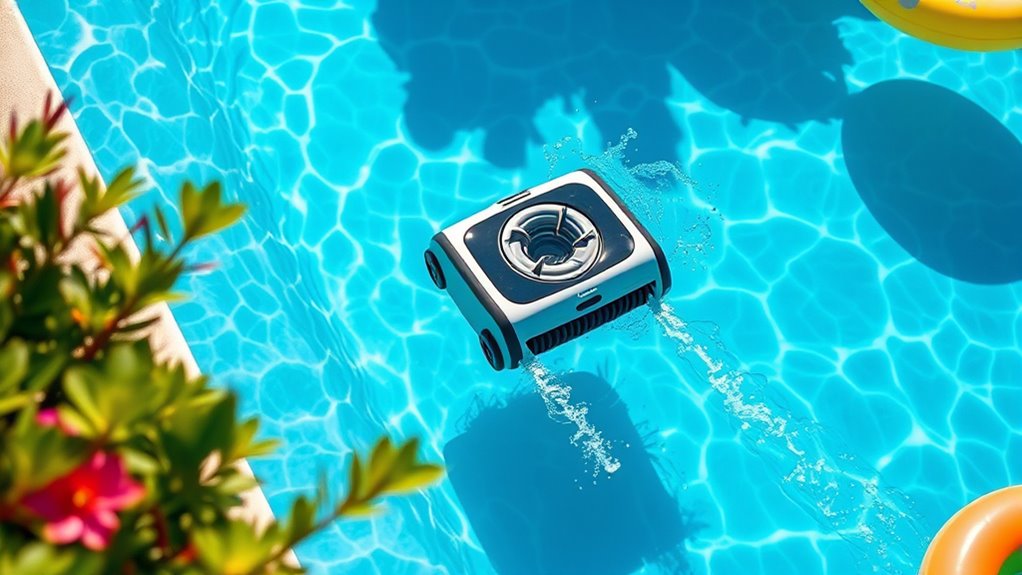
Regularly running your pool cleaner offers numerous benefits that keep your pool in top condition. It helps maintain proper pool chemical balancing by preventing debris buildup that can interfere with chemical effectiveness. A cleaner pool means fewer algae and bacteria, reducing the need for harsh chemicals. Consistent operation also supports pool filter maintenance by preventing debris from clogging filters, which keeps circulation efficient and extends filter lifespan. When your cleaner runs regularly, you’ll spend less time on manual cleaning and troubleshooting issues caused by neglected debris. Plus, a well-maintained pool looks inviting and stays healthier for swimmers. Overall, regular cleaning ensures your pool remains sparkling, balanced, and easy to care for, saving you time, money, and effort in the long run.
Risks of Overusing Your Suction Cleaner

While running your pool cleaner often helps keep your pool clean and balanced, overdoing it can lead to problems. Excessive operation may disrupt your pool chemistry, causing pH imbalances or algae growth. It can also strain your equipment, leading to premature wear or breakdown.
To avoid these issues, watch out for:
- Imbalanced pool chemistry due to over-cleaning
- Increased strain on the pump and motor
- Higher energy costs from frequent use
- Accelerated wear on hoses and filters
Overuse may also lead to unnecessary maintenance, reducing your equipment’s lifespan. Be mindful of your pool’s needs and set a reasonable cleaning schedule to keep everything running smoothly without risking damage. Balance is key to maintaining a healthy, sparkling pool.
Optimal Scheduling for Different Pool Types

Different types of pools require tailored cleaning schedules to guarantee ideal performance and longevity. For example, shaded pools with less sunlight may need less frequent cleaning since algae growth slows down, but you still need to monitor pool chemical levels regularly. In contrast, pools exposed to direct sunlight and higher debris levels benefit from more frequent cleaning to prevent algae buildup and maintain water clarity. Adjust your suction pool cleaner schedule based on pool shading, ensuring you don’t overclean and disrupt the pool’s chemical balance. Regularly testing and adjusting pool chemical levels helps keep the water safe and clear, reducing the need for excessive cleaning. By customizing your cleaning routine according to your pool’s specific environment, you’ll optimize efficiency and extend your pool’s lifespan.
Tips for Efficient Pool Maintenance
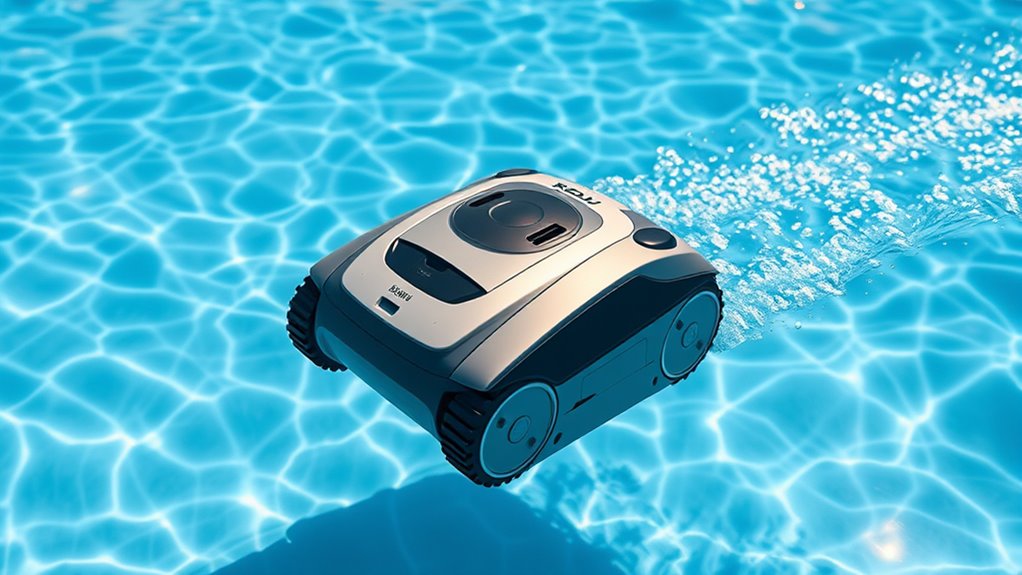
To keep your pool in top condition, implementing efficient maintenance practices can save you time and money. Here are key tips for ideal upkeep:
- Regularly test and balance your pool chemical levels to prevent algae and bacteria growth.
- Clean or replace your filter frequently to ensure proper water flow and filtration.
- Schedule weekly filter maintenance to remove debris and maintain efficiency.
- Monitor your water’s pH and chlorine levels daily, adjusting as needed to keep water safe and clear.
Consistent attention to pool chemical balance and filter maintenance minimizes the need for costly repairs and keeps your pool sparkling. Following these simple steps helps maintain water quality and extends the lifespan of your pool equipment.
Frequently Asked Questions
Can I Run My Suction Pool Cleaner Daily Without Issues?
Running your suction pool cleaner daily isn’t usually necessary and could impact your pool’s maintenance schedule. While it might help keep your pool spotless, frequent use can wear out the cleaner faster, reducing its lifespan. You should balance regular cleaning with proper pool maintenance routines. Usually, running it a few times a week is enough to keep your pool clean without risking damage, ensuring your cleaner stays effective longer.
How Long Should Each Cleaning Session Last for Optimal Results?
Think of cleaning your pool like a gentle breeze—nothing too harsh. For ideal timing, aim for a cleaning duration of about 1-2 hours per session. This allows your suction pool cleaner to do its job thoroughly without overworking the equipment. Adjust based on pool size and debris levels, but generally, sticking to this range keeps your pool sparkling and your cleaner happy and healthy.
Does the Type of Debris Affect Cleaning Frequency Recommendations?
The type of debris definitely impacts your cleaning frequency. Light debris like leaves or dust requires less frequent cleanings, maybe once a week. Heavier debris such as dirt or algae might need more frequent runs to keep your pool clear. Consider debris types when planning your cleaning schedule, adjusting based on what’s accumulating. Regularly assess your pool’s condition to guarantee ideal cleaning frequency and maintain clear, healthy water.
Should I Manually Intervene During the Cleaner’S Operation?
A stitch in time saves nine, so you should monitor your suction pool cleaner during its operation. While manual oversight isn’t always necessary, it helps with troubleshooting tips if you notice uneven cleaning or blockages. Keep an eye on the cleaner’s progress, and intervene if you see it struggling or if debris is clogging the system. Your proactive approach ensures peak performance and a cleaner pool with less hassle.
How Does Pool Usage During Parties Influence Cleaning Schedules?
When you host parties, your pool gets more use, which impacts your pool maintenance and cleaning schedules. More swimmers and activity introduce dirt, debris, and oils, so you should run your suction pool cleaner more frequently to keep the water clear and balanced. Regular cleaning ensures your pool stays inviting, especially after gatherings. Adjust your cleaning schedule based on pool usage, especially during busy times, to maintain ideal water quality.
Conclusion
Just like a well-tuned orchestra, balancing your pool’s cleaning schedule keeps everything running smoothly. Regularly running your suction pool cleaner prevents buildup, much like tending a garden ensures vibrant blooms. But don’t overdo it—think of it as walking a tightrope, where too much effort can cause imbalance. By paying attention to your pool’s needs and the seasons, you’ll enjoy crystal-clear water all year, turning your backyard into a private paradise worthy of the gods.

